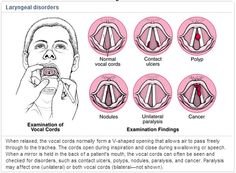the singing voice and possible dangers
Most of the people have the feeling to give credits to someone who sings beautifully, but I think there is more behind the singing voice than just the sound. I think technique of your voice cords should play a much bigger role than it plays right now. One thing is sure, if technique would play a bigger role, shows like The Voice would end up very different than they are now. The rating based on sound is not wrong, but it just does not show the whole picture and that is why I want to inform whoever reads this a little bit about singing.
Your vocal cords are based in the larynx. They will produce sound when the cords vibrate against each other. The vibrating is done by sending air from your lungs against your cords, so that they will move and so that the glottis appears; the glottis is a gap between your two cords. You can control the movement of the cords by yourself too. It is hard to explain on paper, but the result should be a soft clicking sound. The resonance spaces in your head play a big part, because they are similar to sound boxes, except that a sound box of a instrument can not change shape and your resonance spaces in the head can.
The skill of the singer is the control of the air pressure on the vocal cords, by which your determine the quality of the sound of your voice. This control of air pressure is developed by training your vocal cords. Since your vocal cords are muscles as well it is necessary to treat your voice and training like a sport on high level. In this way you can avoid injuries. The more you train, provided that you do it the right way with professional supervision or advice, the stronger your muscles or vocal cords become.
The most common injure is polyp, that often starts with a little nodule on the vocal cords. Later it can become a hardened moisture accumulation. Because of this nodule the vocal cords can not close entirely. Your air flow can not fully close up, which can produce a hoarse sound.

There are different ways to recognize damaging usage of the voice:
- Your voice is tired fast, wherein itch and pain are different signs. An itchy voice can be a sign of the usage of new muscles, but pain is a sign of working too hard or putting pressure on the vocal cords. A husky voice is an effect of pain.
- When you do not warm up long enough the change to damage your voice is higher
- A pitch fracture
- The hearable presence of air in combination with clearing the throat
- The speaking voice sounds different after singing
People often do not notice it when one of these signs appear. By passing time their voice will deteriorate. Most of the times they will not notice the signs, because they are too focused on listening to the sound, but using the singing voice is not about the sound, but about how you produce it and especially how it feels. Well… as long as you want to enjoy your vocal cords for the rest of your life.
Singing got more requirements than just producing nice sounds:
- Singing on pitch in tune
- Knowing and controlling your voice
- Dynamic control
- A healthy trained voice
- Changing the quality of your voice
When you voice is average trained the vocal cords have learned some habits that make you adjust different techniques by ease. It is about developing the free space of your voice and using the resonance spaces optimally, without focusing on the results. When you are too busy with the singing or de sound, your muscles will work too hard and they will put pressure on your vocal cords. The best advice is to sing with imagery, because it is about feeling the right feeling. You have to stop thinking and listening to the result and take into account the resonance spaces of your body while you are thinking about the feeling you want to achieve within your larynx. Enjoy the feeling of singing instead of enjoying the sound that you produce, if you want to enjoy singing your whole life. It will bring joy.
Yours sincerely, @inMusicalTerms
Very good advice @inmusicalterms! I always love an informative blog, especially about music and singing! I am a singer and started exercises about 6 months ago. I'm learning more about using resonance and breathing properly! Great post! And you have a new follower! ;)
Thank you :) maybe I should do more posts about singing
You got a 13.74% upvote from @getboost courtesy of @inmusicalterms!
Great one